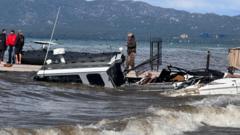The ongoing conflict in Kashmir sharply escalated when Indian and Pakistani armed forces briefly exchanged gunfire along their contested border, heightening fears of renewed violence.
Escalating Tensions: Kashmir Under Fire

Escalating Tensions: Kashmir Under Fire
An exchange of fire occurs between India and Pakistan in Kashmir amid rising tensions following a recent terror attack.
In a region marked by longstanding hostilities, the situation has intensified just days after a brutal terror attack claimed the lives of 26 individuals on the Indian side. Local news outlets reported that Pakistani soldiers initiated the firing directed at an Indian outpost, to which Indian soldiers retaliated. Fortunately, the clash, described as short-lived, resulted in no reported casualties. Officials from both countries refrained from comment at this time.
These incidents are occurring against a backdrop of heightened tensions following a massacre on Tuesday, wherein militants targeted civilians—primarily tourists—at a scenic location near Pahalgam in Kashmir. With India labeling the event as a terrorist act while refraining from attributing responsibility to specific groups, the Indian government has reacted by implementing punitive steps against Pakistan. In particular, India’s foreign secretary indicated evidence of “cross-border linkages” related to the attack, leading India to announce the downgrading of diplomatic relations and the withdrawal from a pivotal water-sharing treaty advantageous to Pakistan.
The Pakistani government, on its part, has categorically denied connections to the attack. Its defense minister stated that Pakistan does not condone terrorism in any form. In response to India’s actions, Pakistan’s government moved to cease airspace access for Indian airlines. Additionally, the Pakistani Senate unanimously condemned India’s allegations, labeling them as “frivolous and baseless” and accused New Delhi of manipulating terrorism for political gains.
As this conflict continues to unfold, the international community remains watchful, given the nuclear capabilities of both nations and the potential for wider regional implications. The fragile peace in Kashmir persists under threat, demanding urgent diplomatic dialogue to establish stability.
These incidents are occurring against a backdrop of heightened tensions following a massacre on Tuesday, wherein militants targeted civilians—primarily tourists—at a scenic location near Pahalgam in Kashmir. With India labeling the event as a terrorist act while refraining from attributing responsibility to specific groups, the Indian government has reacted by implementing punitive steps against Pakistan. In particular, India’s foreign secretary indicated evidence of “cross-border linkages” related to the attack, leading India to announce the downgrading of diplomatic relations and the withdrawal from a pivotal water-sharing treaty advantageous to Pakistan.
The Pakistani government, on its part, has categorically denied connections to the attack. Its defense minister stated that Pakistan does not condone terrorism in any form. In response to India’s actions, Pakistan’s government moved to cease airspace access for Indian airlines. Additionally, the Pakistani Senate unanimously condemned India’s allegations, labeling them as “frivolous and baseless” and accused New Delhi of manipulating terrorism for political gains.
As this conflict continues to unfold, the international community remains watchful, given the nuclear capabilities of both nations and the potential for wider regional implications. The fragile peace in Kashmir persists under threat, demanding urgent diplomatic dialogue to establish stability.





















